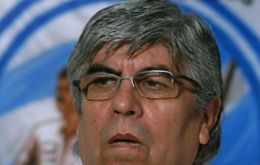MercoPress. South Atlantic News Agency
Tag: Cristina Fernandez
-
Thursday, February 17th 2011 - 02:45 UTC
Seized cargo incident: US government “has no reason to apologize” to Argentina

US Assistant Secretary of State for Public Affairs Philip Crowley assured that the US government “has no reason to apologize” to Argentina in the case of the “sensitive materials” that were seized in a US Air Force plane by the local government last week, amid accusations of “attempting to smuggle surveillance and communications equipment.”
-
Thursday, February 17th 2011 - 01:18 UTC
Argentina’s boost-industry import restrictions estimated in one billion US dollars

Imports restrictions imposed this week by the Argentine government with the purpose of “preserving the re-industrialization process” cover approximately 200 products totalling annual imports of a billion US dollars, according to preliminary reports.
-
Wednesday, February 16th 2011 - 06:18 UTC
Argentine Justice takes on the incident of the US Air Force plane cargo

Argentine Judge Ezequiel Berón de Astrada requested on Tuesday Foreign Minister Héctor Timerman; Security Minister Nilda Garré; and the US Embassy “all the information they have” on the incident regarding the US Air Force plane seized in Ezeiza international airport.
-
Monday, February 14th 2011 - 03:36 UTC
Argentines accept inflation is in the range of 25%, but divided on the causes

A majority of Argentines, 74%, believes that inflation is harming their finances and a similar percentage, 74%, considers the administration of President Cristina Fernandez de Kirchner is hardly interested in the issue, according to a public opinion poll published Sunday in Buenos Aires La Nacion.
-
Friday, February 11th 2011 - 06:52 UTC
Argentine business leaders urge government to “stop denying inflation”

The head of Argentina’ powerful Business Leaders Association (ADE) urged the government to “stop denying inflation” and rejected the notion that businessmen are responsible for price hikes.
-
Wednesday, February 9th 2011 - 20:13 UTC
A former secretary of Nestor Kirchner claims she was his mistress

A former secretary of Nestor Kirchner, the late ex-president of Argentina, has claimed she was his long-term mistress weeks after being sacked by his widow and successor, Cristina Fernandez de Kirchner.
-
Tuesday, February 8th 2011 - 05:22 UTC
When the Kirchners are over, Argentina will be a “minefield not a country”

According to new Wikileaks cables unveiled by Spanish daily El Pais, Argetnina’s former Santa Fe governor Carlos Reutemann told US diplomats that “whoever comes after the Kirchner administrations will inherit a mine field” instead of a country.
-
Wednesday, February 2nd 2011 - 07:06 UTC
Argentina declares compulsory conciliation to end crippling strike at export ports

Argentina's government has ordered unions to suspend a week-old strike at leading grains ports for a 15-day period to hold talks with company bosses, a Labour Ministry spokesman said on Tuesday.
-
Wednesday, February 2nd 2011 - 06:53 UTC
Trade deficit main “concern” for Argentine/Brazilian relations

Argentine Foreign Affairs minister Héctor Timerman revealed Tuesday that the trade deficit Argentina has with Brazil is “concerning”, and indicated that both nations are working “to reduce it.”
-
Tuesday, February 1st 2011 - 00:06 UTC
Brazil and Argentina ratify “strategic relation” and commit greater integration

In her first overseas visit as Brazilian president, Dilma Rousseff ratified Monday in Buenos Aires the “special strategic” relation with Argentina while her counterpart Cristina Fernandez de Kirchner, CFK, called for an “increased productive integration” between the two leading Mercosur partners.
